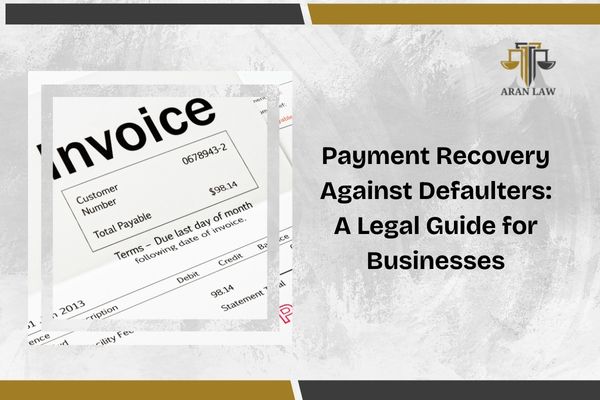Table of Contents:
- Understanding Payment Recovery in India
- Why Prompt Payment Recovery is Crucial for Your Business
- Challenges in Payment Recovery Against Defaulters
- The Step-by-Step Process for Payment Recovery
- Key Legal Avenues for Payment Recovery
- Choosing the Right Legal Strategy: A Comparative Look
- Common Mistakes to Avoid in Payment Recovery
- FAQs About Payment Recovery in India
- Quick-Start Summary & Checklist
- Key Takeaways
- About the Author
- References
- Disclaimer
Understanding Payment Recovery in India
Payment recovery against defaulters in India involves a structured legal process to reclaim overdue payments from individuals or companies. This can range from sending a formal legal notice to initiating civil suits, insolvency proceedings, or arbitration, depending on the specifics of the case. The primary goal is to use the legal framework to compel the defaulter to settle their outstanding debts in a timely and efficient manner.
Why Prompt Payment Recovery is Crucial for Your Business
Unpaid invoices are more than just a nuisance; they can severely impact your operating capital and your business’s financial health. Prompt and effective payment recovery against defaulters is essential for several reasons:
- Maintaining Healthy Cash Flow: Consistent cash flow is the lifeblood of any business. Delayed payments can disrupt your operations, making it difficult to pay salaries, suppliers, and other overheads.
- Preventing Bad Debts: The longer a debt remains unpaid, the harder it becomes to recover. Taking swift action increases the likelihood of a successful recovery.
- Setting a Precedent: A proactive approach to debt recovery sends a clear message to other clients that you take payment terms seriously.
- Protecting Your Bottom Line: Recovering what you’re owed directly impacts your profitability and long-term sustainability.
Challenges in Payment Recovery Against Defaulters
While the Indian legal system provides several avenues for debt recovery, businesses often face challenges such as:
- Lengthy Legal Processes: The traditional court system can be time-consuming, with cases sometimes dragging on for years.
- Evasive Defaulters: Some defaulters may deliberately abscond, change their contact information, or transfer assets to avoid payment.
- Lack of Proper Documentation: Inadequate contracts, invoices, or communication records can weaken your case and make recovery difficult.
- Jurisdictional Issues: Determining the correct court or tribunal to approach can be complex, especially in cases involving multiple states or international parties.
Case Study: A software development firm that was owed a significant amount by a client for a completed project. The client kept making excuses, from minor bugs to changes in their management. It was discovered that the client was on the verge of insolvency. By quickly filing a petition under the Insolvency and Bankruptcy Code (IBC), the client was able to put pressure on the client and secure a settlement before they declared bankruptcy. This experience underscored the importance of acting decisively when you suspect a client is experiencing financial difficulties.
The Step-by-Step Process for Payment Recovery
Navigating the process of payment recovery against defaulters can be daunting. Here’s a simplified breakdown of the steps involved:
- Internal Follow-ups: Begin with polite but firm reminders through emails, phone calls, and formal letters. Document all communication.
- Legal Notice: If internal efforts fail, the next step is to have a lawyer send a formal legal notice. This is a crucial document that outlines your claim and warns of impending legal action.
- Negotiation and Mediation: Before heading to court, consider negotiation or mediation to reach an amicable settlement. This can save time and money for both parties.
- Initiating Legal Proceedings: If all else fails, you may need to initiate legal action. The specific course of action will depend on the nature of the debt and the amount involved.
- Enforcement of Decree/Order: Once you have a favorable court order or arbitral award, you may need to file for its execution to recover the amount, which can involve attaching the defaulter’s assets.
Alt text: A flowchart showing the five-step process of payment recovery against defaulters.
Key Legal Avenues for Payment Recovery
India offers several legal pathways for payment recovery against defaulters. The best option for you will depend on the specifics of your case.
Civil Suit for Recovery of Money
A civil suit is the most common method for debt recovery. You can file a suit under Order 37 of the Code of Civil Procedure, 1908, for a summary judgment, which is a faster process for undisputed claims.
Insolvency and Bankruptcy Code, 2016 (IBC)
The IBC is a powerful tool for recovering debts from corporate defaulters. If a company owes you more than ₹1 crore, you can initiate a Corporate Insolvency Resolution Process (CIRP) against them.
Case Study 2: A manufacturing company supplied goods worth ₹1.5 crore to a large corporation. Despite repeated reminders, the payment was not made. It was advised to the manufacturing company to file a petition under the IBC. The mere threat of insolvency proceedings was enough to bring the corporation to the negotiating table, and we were able to recover the full amount within 60 days.
Arbitration and Conciliation Act, 1996
If your contract includes an arbitration clause, you can initiate arbitration proceedings to resolve the dispute. Arbitration is generally faster and more flexible than traditional court proceedings.
Negotiable Instruments Act, 1881
If the default is due to a bounced cheque, you can file a criminal complaint under Section 138 of the Negotiable Instruments Act. This can result in imprisonment for the defaulter, making it a strong deterrent.
Choosing the Right Legal Strategy: A Comparative Look
| Method | Best For | Pros | Cons |
| Civil Suit | Disputed claims, no arbitration clause | Can claim interest and damages | Time-consuming, expensive |
| IBC | Corporate debts over ₹1 crore | Fast-track process, high recovery rate | Not suitable for small debts |
| Arbitration | Contracts with arbitration clauses | Faster, confidential, flexible | Can be expensive |
| Section 138 (NI Act) | Bounced cheques | Criminal liability, strong deterrent | Only applicable to cheque bounce cases |
Common Mistakes to Avoid in Payment Recovery
- Delaying Action: Time is of the essence in debt recovery. The longer you wait, the more difficult it becomes to recover the money.
- Poor Documentation: Always maintain clear and comprehensive records of all transactions, contracts, and communications.
- Not Seeking Legal Advice: Trying to handle the legal process on your own can lead to costly mistakes. It’s always best to consult with experienced debt recovery lawyers in India.
- Ignoring the Defaulter’s Financial Health: Before initiating legal action, it’s important to assess the defaulter’s ability to pay.
Case Study 3: A client who wanted to file a case against a small business for a relatively minor amount. After some investigation, it is found that the business was on the brink of collapse. So the client was advised to negotiate a smaller settlement rather than spending time and money on a lawsuit that would likely yield nothing. This highlights the importance of a pragmatic approach to payment recovery.
FAQs About Payment Recovery in India
A1: The first step is to send a formal legal notice through a lawyer. This often prompts the defaulter to settle the debt without the need for further legal action.
A2: The timeline can vary greatly depending on the complexity of the case and the court’s workload. A summary suit can be resolved in 6-12 months, while a regular civil suit can take several years.
A3: Yes, in most cases, the court will order the losing party to pay the legal costs of the successful party.
A4: If the defaulter is insolvent, it may be difficult to recover the full amount. However, it’s still worth exploring legal options, as you may be able to recover a portion of the debt through insolvency proceedings.
A5: Non-payment of dues is generally a civil matter. However, if there is an element of fraud or criminal breach of trust, you may be able to file a police complaint.
A6: While it’s not mandatory, it’s highly recommended. An experienced payment recovery lawyer in India can guide you through the complex legal process and significantly increase your chances of a successful recovery.
Quick-Start Summary & Checklist
Effective payment recovery against defaulters requires a proactive and strategic approach. By understanding the legal options available and avoiding common pitfalls, you can protect your business’s financial health and ensure you get paid for your hard work.
Checklist
- [ ] Review all contracts, invoices, and communication records.
- [ ] Send a formal legal notice to the defaulter.
- [ ] Explore negotiation and mediation options.
- [ ] Consult with a debt recovery lawyer in India to determine the best legal course of action.
- [ ] Gather all necessary documents to support your case.
- [ ] Be prepared for a potentially lengthy legal process.
Key Takeaways
- Prompt action is crucial for successful payment recovery against defaulters.
- Proper documentation is the foundation of a strong recovery case.
- India offers multiple legal avenues for debt recovery, each with its own pros and cons.
- Seeking professional legal advice from experienced payment recovery lawyers in India can significantly improve your chances of success.
About the Author

Shanmugapriya is an accomplished Advocate of the High Court of Madras with over a decade of experience in handling complex legal cases, specializing in commercial disputes and debt recovery. Her expertise spans various legal forums, including the Commercial Courts, the National Company Law Tribunal, and arbitration panels. Shanmugapriya is known for her practical, results-oriented approach and her deep understanding of the intricacies of Indian commercial law.
References
- The Ministry of Law and Justice, Government of India. (1908). The Code of Civil Procedure, 1908. Retrieved from https://www.indiacode.nic.in/handle/123456789/2191?sam_handle=123456789/1362
- The Ministry of Corporate Affairs, Government of India. (2016). The Insolvency and Bankruptcy Code, 2016. Retrieved from https://www.ibbi.gov.in/en/legal-framework/act
- The Ministry of Law and Justice, Government of India. (1996). The Arbitration and Conciliation Act, 1996. Retrieved from https://legislative.gov.in/sites/default/files/A1996-26.pdf
- The Ministry of Law and Justice, Government of India. (1881). The Negotiable Instruments Act, 1881. Retrieved from https://legislative.gov.in/sites/default/files/A1881-26.pdf
Disclaimer
Legal Disclaimer: The information provided in this blog post is for general informational purposes only and does not constitute legal advice. The legal landscape is constantly evolving, and the information may not be up-to-date or applicable to your specific situation. It is strongly recommended that you consult with a qualified legal professional for advice tailored to your individual circumstances.

